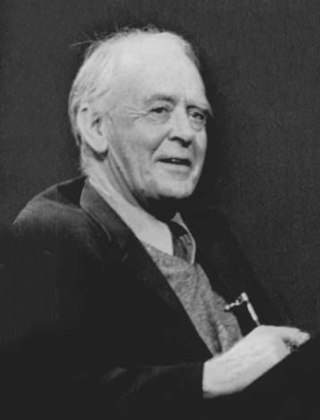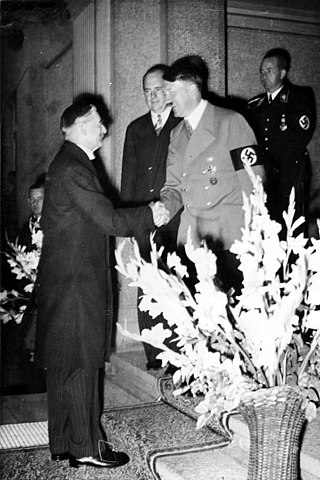Keynesian economics are the various macroeconomic theories and models of how aggregate demand strongly influences economic output and inflation. In the Keynesian view, aggregate demand does not necessarily equal the productive capacity of the economy. It is influenced by a host of factors that sometimes behave erratically and impact production, employment, and inflation.

John Maynard Keynes, 1st Baron Keynes, was an English economist and philosopher whose ideas fundamentally changed the theory and practice of macroeconomics and the economic policies of governments. Originally trained in mathematics, he built on and greatly refined earlier work on the causes of business cycles. One of the most influential economists of the 20th century, he produced writings that are the basis for the school of thought known as Keynesian economics, and its various offshoots. His ideas, reformulated as New Keynesianism, are fundamental to mainstream macroeconomics. He is known as the "father of macroeconomics".
Post-Keynesian economics is a school of economic thought with its origins in The General Theory of John Maynard Keynes, with subsequent development influenced to a large degree by Michał Kalecki, Joan Robinson, Nicholas Kaldor, Sidney Weintraub, Paul Davidson, Piero Sraffa and Jan Kregel. Historian Robert Skidelsky argues that the post-Keynesian school has remained closest to the spirit of Keynes' original work. It is a heterodox approach to economics.

Sir John Richard Hicks was a British economist. He is considered one of the most important and influential economists of the twentieth century. The most familiar of his many contributions in the field of economics were his statement of consumer demand theory in microeconomics, and the IS–LM model (1937), which summarised a Keynesian view of macroeconomics. His book Value and Capital (1939) significantly extended general-equilibrium and value theory. The compensated demand function is named the Hicksian demand function in memory of him.

Appeasement, in an international context, is a diplomatic negotiation policy of making political, material, or territorial concessions to an aggressive power with intention to avoid conflict. The term is most often applied to the foreign policy between 1935 and 1939 of the British governments of Prime Ministers Ramsay MacDonald, Stanley Baldwin and most notably Neville Chamberlain towards Nazi Germany and Fascist Italy. Under British pressure, appeasement of Nazism and Fascism also played a role in French foreign policy of the period but was always much less popular there than in the United Kingdom.

Sir Howard Kingsley Wood was a British Conservative politician. The son of a Wesleyan Methodist minister, he qualified as a solicitor, and successfully specialised in industrial insurance. He became a member of the London County Council and then a Member of Parliament.
Maurice Herbert Dobb was an English economist at Cambridge University and a Fellow of Trinity College, Cambridge. He is remembered as one of the pre-eminent Marxist economists of the 20th century. Dobb was highly influential outside of economics, having helped to establish the Communist Party Historians Group which developed social history and attracted future members of the Cambridge Five to Marxism in the 1930s.

John Leonard Eatwell, Baron Eatwell, is a British economist who was President of Queens' College, Cambridge, from 1996 to 2020. A former senior advisor to the Labour Party, Lord Eatwell sat in the House of Lords as a non-affiliated peer from 2014 to 2020, before returning to the Labour bench.

Abraham "Abba" Ptachya Lerner was a Russian-born American-British economist.

Alvin Harvey Hansen was an American economist who taught at the University of Minnesota and was later a chair professor of economics at Harvard University. Often referred to as "the American Keynes", he was a widely read popular author on economic issues, and an influential advisor to the government on economic policy. Hansen helped create the Council of Economic Advisors and the Social Security system. He is best remembered today for introducing Keynesian economics in the United States in the 1930s and 40s.

British re-armament was a period in British history, between 1934 and 1939, when a substantial programme of re-arming the United Kingdom was undertaken. Re-armament was deemed necessary, because defence spending had gone down from £766 million in 1919–20, to £189 million in 1921–22, to £102 million in 1932.

Sir Ralph George Hawtrey was a British economist, and a close friend of John Maynard Keynes. He was a member of the Cambridge Apostles, the University of Cambridge intellectual secret society.
The neoclassical synthesis (NCS), or neoclassical–Keynesian synthesis is an academic movement and paradigm in economics that worked towards reconciling the macroeconomic thought of John Maynard Keynes in his book The General Theory of Employment, Interest and Money (1936) with neoclassical economics.
The Geddes Axe was the drive for public economy and retrenchment in UK government expenditure recommended in the 1920s by a Committee on National Expenditure chaired by Sir Eric Geddes and with Lord Inchcape, Lord Faringdon, Sir Joseph Maclay and Sir Guy Granet also members.

Paul Davidson was an American macroeconomist who has been one of the leading spokesmen of the American branch of the post-Keynesian school in economics. He has actively intervened in important debates on economic policy from a position critical of mainstream economics.

The Keynesian Revolution was a fundamental reworking of economic theory concerning the factors determining employment levels in the overall economy. The revolution was set against the then orthodox economic framework, namely neoclassical economics.

Macroeconomic theory has its origins in the study of business cycles and monetary theory. In general, early theorists believed monetary factors could not affect real factors such as real output. John Maynard Keynes attacked some of these "classical" theories and produced a general theory that described the whole economy in terms of aggregates rather than individual, microeconomic parts. Attempting to explain unemployment and recessions, he noticed the tendency for people and businesses to hoard cash and avoid investment during a recession. He argued that this invalidated the assumptions of classical economists who thought that markets always clear, leaving no surplus of goods and no willing labor left idle.
Athanasios "Tom" Asimakopulos was a Canadian economist, who was the "William Dow Professor of Political Economy" in the Department of Economics, McGill University, Montreal, Quebec, Canada. His monograph, Keynes's General Theory and Accumulation, reviews important areas of Keynes's General Theory and the theories of accumulation of two of his most distinguished followers, Roy Harrod and Joan Robinson.
The Macmillan Committee, officially known as the Committee on Finance and Industry, was a committee, composed mostly of economists, formed by the British Labour government after the 1929 stock market crash to determine the root causes of the depressed economy of the United Kingdom. The Macmillan Committee was formed in 1929 by Royal Command 3897, and it was tasked with determining whether the contemporary banking and financial system was helping or hindering British trade and industry. Scottish lawyer Hugh Pattison Macmillan was named as its chairman, although due to his lack of economic or financial expertise, he largely "remained in the background". Other members of the committee included Ernest Bevin, Lord Bradbury, R. H. Brand, Theodore Gregory, John Maynard Keynes, and Reginald McKenna.
Peace economics is a branch of conflict economics and focuses on the design of the sociosphere's political, economic, and cultural institutions and their interacting policies and actions with the goal of preventing, mitigating, or resolving violent conflict within and between societies. This violent conflict could be of any type and could involve either latent or actual violence. Recognizing the cost of violence, peace economics focuses on the benefits of (re)constructing societies with a view toward achieving irreversible, stable peace. Along with approaches drawn from other areas of scholarship, peace economics forms part of peace science, an evolving part of peace and conflict studies.










